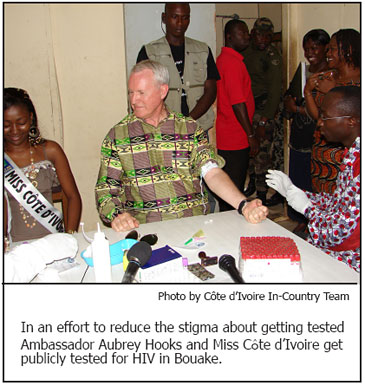|
In this Issue:
Côte d'Ivoire: New Emergency Plan Initiative in New Forces Territory Demonstrates the Promise of Partnerships in Côte d’Ivoire [more]
Thailand: Thailand Lowers TB Death Rates and Increases Cure Rates [more]
Democratic Republic of the Congo: Congolese Musicians Raise HIV/AIDS Awareness in the DRC [more]
New Emergency Plan Initiative in New Forces Territory Demonstrates the Promise of Partnerships in Côte d’Ivoire

A recently launched initiative in the Northern and Western regions of Côte d’Ivoire is using the promise of partnerships to provide much needed HIV/AIDS services to two of the country’s regions hardest hit by war. Supported by the U.S. President’s Emergency Plan for AIDS Relief (Emergency Plan/PEPFAR), the program is restoring health care services that were devastated by the country’s four-year civil war.
To date, approximately 6,000 people have taken part in the multi-million dollar "Proximity Communication and Behavior Change" HIV/AIDS campaign. The program has engaged more than 700 peer-educators in a behavior change campaign and distributed nearly 5,000 condoms.
HIV-positive people living in war zones under the control of the New Forces often face challenges when trying to access HIV/AIDS treatment. This program, the second of its kind, provides HIV/AIDS services to hundreds of villages and towns located in Côte d’Ivoire’s war-torn regions.
Designed and implemented by CARE International, a non-governmental organization, the project was launched in Bouake on Aug. 25, 2006 by U.S. Ambassador to Côte d’Ivoire, Aubrey Hooks, and Miss Côte d’Ivoire, Alima Diomandé.
The initiative will also provide support for campaigns aimed at preventing new infections, treating those already living with HIV, and offering care for orphans and vulnerable children affected by the epidemic. |
 |
“The President’s Emergency Plan will bring needed relief to areas too long neglected, and will help to replace despair with hope,” Ambassador Hooks said during the program’s launch. “AIDS does not respect artificial boundaries or make distinctions between social class, race or ethnicity. That is why we must all join hands to bring our fight against this virus to every corner of the country.”
To launch the program, Ambassador Hooks and Miss Côte d’Ivoire led a kilometer march with more than 300 Bouake residents to an HIV/AIDS testing center, where they were tested for HIV. It sent a powerful message through the streets of Bouake and across the country about the importance of knowing your HIV status.
This was Miss Côte d’Ivoire’s first trip to the North since her election as the reigning beauty queen of the divided country, and she brought with her an important message – one that will help to empower women, and put men on notice:
“I will not go out with someone who doesn’t know their status, and I encourage young people like me to do the same,” Ms. Diomandé said during stops in Korhogo, Komborodougou, Ferkessédougou and Bouake.
The march concluded with a 1,300-kilometer caravan through the North led by Miss Côte d’Ivoire. The march also included representatives from the American Embassy in Côte d’Ivoire, the Ivoirian Ministry in the Fight Against AIDS, and REPMASCI, a national non-governmental organization of media and cultural leaders involved in the campaign to turn the tide against HIV/AIDS. It was a trip with great symbolic and substantive importance.
Approximately 750,000 people currently are living with HIV/AIDS in Côte d’Ivoire. The country has the highest HIV prevalence in West Africa, with an estimated adult prevalence of 7.1 percent, according to the UNAIDS Report on the Global AIDS Epidemic, 2006. UNAIDS also reports that 65,000 people have died from AIDS and that 450,000 children have been orphaned by the epidemic. |
Thailand Lowers TB Death Rates and Increases Cure Rates

Thailand has become a leader in tuberculosis (TB) prevention and control in Southeast Asia, due to the Thailand TB Active Surveillance Network (TBNet). The success of TBNet’s model to increase the number of TB patients being tested for HIV — nearly double what it was a year ago in four Thai provinces — has prompted the World Health Organization to use this model in nine other countries.
TBNet, a partnership between the U.S. Government and the Thai Office of Disease Prevention and Control, identifies new cases of both TB and HIV/AIDS, by casting a wider net than past systems. Due to the high rate of co-morbidity between TB and HIV/AIDS, testing for both diseases is crucial.
Recent data from a TBNet province indicates that the death rate among TB patients has dropped significantly — from 48 percent in 2003 to 17 percent in 2004. Over the same period, the TB treatment success rate increased from 38 percent to 68 percent.
Due to the program’s success, the Thai Government changed its policy on TB and HIV/AIDS, recommending HIV counseling and testing for all TB patients. The government also revised the national TB register to collect data about HIV services provided to TB patients; it also started issuing regular national reports about the performance of TB/HIV services.
“TB patients don’t really need much of a push,” Dr. Jay Varma, head of the program said. “If you make it easy by providing the test at the TB clinic, and doing it for free, then very few will refuse.”
TBNet provides training and resources to ensure that local health providers have both the skills and the time to control HIV-associated TB (TB/HIV) more aggressively. “We complement each other well,” Dr. Somsak Akksilp, of the Thai Office of Disease Prevention and Control, said of the partnership between the two governments.
TBNet also has increased laboratory capacity in Thailand, helped improve TB and HIV care, and has developed a system to monitor HIV and TB services provided to patients. “We’d like to promote integrated testing and care for HIV-infected TB patients throughout the region,” Varma said. The program aims to expand TBNET in the future, in order to reach more people throughout Thailand.
TB is the leading cause of death among people who are HIV-positive. Approximately one-third of the nearly 40 million people living with HIV/AIDS are also infected with TB. |
Know the Facts:
- Tuberculosis (TB) is primarily an illness of the respiratory system, and is spread by coughing and sneezing by infectious people.
- Each year about 1.7 million people die from this curable disease.
- TB is a leading killer of people living with HIV/AIDS and accounts for 13 percent of AIDS deaths worldwide.
- Southeast Asia: With an estimated 3 million new cases of TB each year, this is the world’s hardest-hit region.
- Symptoms of TB include a bad cough that lasts three weeks or longer, pain in the chest, and/or coughing up blood. Those displaying symptoms should seek care and treatment.
For more information please visit www.stoptb.org
|
Congolese Musicians Raise HIV/AIDS Awareness in the DRC

Fourteen well-known Congolese musicians lent their talents recently to help raise awareness about HIV/AIDS in the Democratic Republic of the Congo (DRC). On Dec. 14, 2006, their CD of original music, “ABCD-Rien Que La Vérité,” meaning “nothing but the truth,” was released. “ABCD” in French conveys the U.S. President’s Emergency Plan for AIDS Relief (Emergency Plan/PEPFAR) message of abstinence, be faithful (“bonne fidélité”), condoms and testing (“dépistage”).
The CD is a compilation of original music about HIV/AIDS and includes songs from each musical group plus an ensemble “anthem” style song, “Ba Yaya Dodokolo!” The musicians also made a music video for “Ba Yaya Dodokolo!” and a documentary was produced about the making of the CD.
Twenty thousand CDs have been produced for free distribution throughout the Kinshasa region, predominately through mobile counseling and testing units. Five thousand cassettes also are being distributed to local bus and taxi drivers, as well as cross-border truck drivers in key areas like Lubumbashi, where the HIV infection rate is nearly twice that of the rest of the country.
“ABCD-Rien Que La Vérité’s” immediate popularity led to a two-hour television special to present the music, music video and documentary of the CD’s making on Jan. 13, 2007.
“ABCD-Rien Que La Vérité” was created by partner organizations with the support of the Emergency Plan and is being used to open a much-needed dialogue about HIV/AIDS in the Congo. The DRC was once a leader in HIV/AIDS research and activities, but years of instability have resulted in HIV/AIDS rarely, if ever, being included in public dialogue by key national and local leaders. Stigma and discrimination also have stifled community discussions. |
 |
The CD’s release was covered by local print and broadcast media, and a U.S. Embassy representative appeared on “Rendez-vous des Stars” and “Caribou Varietes,” two music oriented television talk shows, to discuss the role of musicians in promoting HIV/AIDS awareness.
The CD is part of the U.S. Embassy’s efforts to include information about HIV/AIDS in all appropriate programs and activities. During the launch, U.S. Ambassador to the DRC, Roger A. Meece, delivered remarks about PEPFAR and the importance of this project. “This project is significant, because it represents the cooperation of these musicians working together toward a common goal — to pass on a message that will help save lives by preventing new infections of the HIV virus. These musicians have lent their professional skills and talents to this project, for which we are profoundly grateful,” Ambassador Meece said.
Before creating the CD, the musicians attended a seminar to learn about HIV/AIDS to ensure that their lyrics were accurate. The CD’s recording and mixing was done in Kinshasa, and the mastering and pressing of the discs was completed in South Africa. All of the products were branded with the same graphics — a traditional African “pagne” batik fabric which also was used for set decoration and costumes and features the PEPFAR logo.
Future plans for “ABCD-Rien Que La Vérité” include creating more music videos for the tracks. A television serial drama involving the musicians also is being developed. The show is based on the successful Côte d’Ivoire “soap opera” project and will capitalize on the popularity of serial dramas among Congolese viewers and radio listeners. |
Log on to listen Now:
Visit www.abcd-laverite.com to download the CD for free, watch the music video, and read about the artists.
|
Office of the U.S. Global AIDS Coordinator
2100 Pennsylvania Ave. NW Suite 200 Washington, DC 20522 |




 PDF version
PDF version